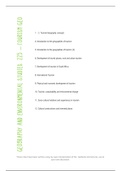Class notes
Geography and Environmental Studies 225 Tourism Geo notes
- Institution
- Stellenbosch University (SUN)
- Book
- Tourism Geography
Lecture summaries for the tourism geography section of the Geography and Environmental Studies 225 module. The document includes work covered in the lectures and information from the textbook, and has all necessary graphs and diagrams/images. A list of topics covered in the lectures can be found on...
[Show more]




